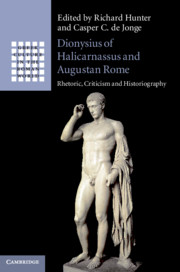Book contents
- Dionysius of Halicarnassus and Augustan Rome
- Greek Culture in the Roman World
- Dionysius of Halicarnassus and Augustan Rome
- Copyright page
- Contents
- Contributors
- Acknowledgements
- A note on editions, translations and abbreviations
- Introduction
- Part 1 Dionysius and Augustan Rhetoric and Literary Criticism
- Part 2 Dionysius and Augustan Historiography
- Part 3 Dionysius and Augustan Rome
- Chapter 8 Dionysius on Regime Change
- Chapter 9 How Roman Are the Antiquities? The Decemvirate according to Dionysius
- Chapter 10 Dionysius and Horace: Composition in Augustan Rome
- Envoi: Migrancy
- Bibliography
- Index of Passages Discussed
- General Index
Chapter 9 - How Roman Are the Antiquities? The Decemvirate according to Dionysius
from Part 3 - Dionysius and Augustan Rome
Published online by Cambridge University Press: 12 October 2018
- Dionysius of Halicarnassus and Augustan Rome
- Greek Culture in the Roman World
- Dionysius of Halicarnassus and Augustan Rome
- Copyright page
- Contents
- Contributors
- Acknowledgements
- A note on editions, translations and abbreviations
- Introduction
- Part 1 Dionysius and Augustan Rhetoric and Literary Criticism
- Part 2 Dionysius and Augustan Historiography
- Part 3 Dionysius and Augustan Rome
- Chapter 8 Dionysius on Regime Change
- Chapter 9 How Roman Are the Antiquities? The Decemvirate according to Dionysius
- Chapter 10 Dionysius and Horace: Composition in Augustan Rome
- Envoi: Migrancy
- Bibliography
- Index of Passages Discussed
- General Index
Summary
- Type
- Chapter
- Information
- Dionysius of Halicarnassus and Augustan RomeRhetoric, Criticism and Historiography, pp. 221 - 241Publisher: Cambridge University PressPrint publication year: 2018
- 1
- Cited by



